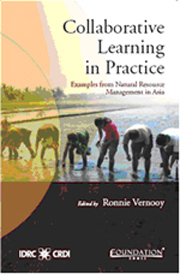Book contents
- Frontmatter
- Contents
- Foreword
- Acknowledgements
- Preface
- Chapter 1 Toward Centres of Excellence for CBNRM (Community-Based Natural Resource Management)
- Chapter 2 Participatory Research and Development in South Asia
- Chapter 3 Adaptive Learning: From Isang Bagsak to the ALL in CBNRM Programme
- Chapter 4 Mainstreaming CBNRM in Chinese Higher Education
- Chapter 5 Comparing the Case Studies
- References
- Notes on Contributors
- Index
Chapter 2 - Participatory Research and Development in South Asia
Published online by Cambridge University Press: 26 October 2011
- Frontmatter
- Contents
- Foreword
- Acknowledgements
- Preface
- Chapter 1 Toward Centres of Excellence for CBNRM (Community-Based Natural Resource Management)
- Chapter 2 Participatory Research and Development in South Asia
- Chapter 3 Adaptive Learning: From Isang Bagsak to the ALL in CBNRM Programme
- Chapter 4 Mainstreaming CBNRM in Chinese Higher Education
- Chapter 5 Comparing the Case Studies
- References
- Notes on Contributors
- Index
Summary
Learning to work with and for local people
“The PR & D project gave us researchers the opportunity to understand the importance of involving the community in selecting suitable varieties of upland Ahu rice. More important, it helped us better understand the cultural diversity of different farming communities in a similar environment, and learn more about their farming practices and livelihood options. We had the opportunity to interact continuously with the community members, understand their behavior and rationale for some of their decisions for rejecting technology improvement in upland Ahu rice.”
Sharma and Pathak (2006)As income and food security have increased for many agricultural communities, the challenge of environmental protection and natural resource management has taken centre stage. Addressing this challenge requires a new approach that involves understanding and sharing of knowledge about livelihood outcomes directly benefiting the poor, enabling the poor to engage in agricultural production while conserving natural resources on a long-term basis, and facilitating joint learning and action within and among local communities. Besides simply transferring technology, the goal of agricultural Research and Development (R & D) has become more complex and emphasis on sustainable management of natural resources has increased.
A number of R & D organizations around the world have adopted the concept of Participatory Research and Development (PR & D) in an effort to capture the essence of this approach. PR & D was also the focus of a collaborative regional programme for capacity development in South Asia.
- Type
- Chapter
- Information
- Collaborative Learning in PracticeExamples from Natural Resource Management in Asia, pp. 19 - 54Publisher: Foundation BooksPrint publication year: 2009



